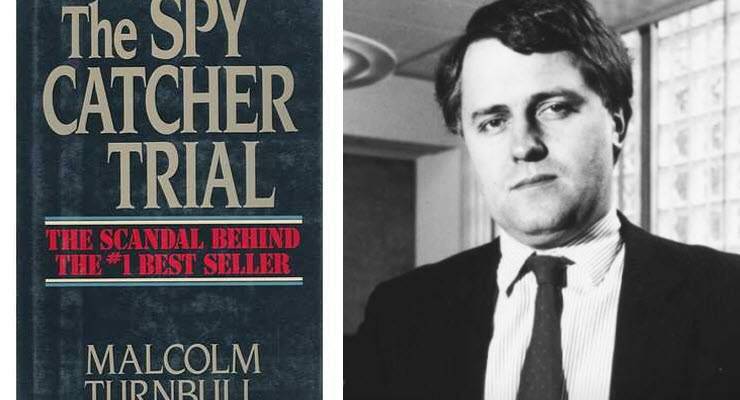
Last year, in discussing the Witness K and Bernard Collaery trial, Crikey‘s Bernard Keane wrote: “We are regularly told that Australia has outstanding intelligence services and an enviable domestic security record”. “But, in fact,” he went on, “Australia’s intelligence services have long displayed incompetence and misconduct”.
As that trial continues (under less than ideal circumstances) and Australian whistleblowers face enormous risk in a growing police state, it’s worth doing some reading. But where to start? We’ve compiled the top five books on Australian spying.
Rooted in Secrecy: The Clandestine Element in Australian Politics
Authors: Joan Coxsedge, Ken Coldicutt, and Gerry Harant
Published: 1982
This book remains the clearest history of Australia’s agencies, treaties and US bases. It explains our role in the Five Eyes, the mass surveillance and intelligence sharing alliance between the UK, US, Canada, Australia and New Zealand. And it asks big questions, such as why secret structures flourish both in overtly totalitarian as well as democratic countries.
The authors, all leaders in the Committee for the Abolition of Political Police (CAPP) and active within the ALP, concede that some clandestine elements of government are necessary, but warn that the size and importance of secret organisations is escalating dangerously.
The book is funny at times, describing the street theatre stunts of CAPP and other clever forms of resistance to spooks, and is unapologetic in its polemical style. It reproduces many primary documents alongside analysis of key events in the US-Australian relationship. This includes the events surrounding the dismissal of Whitlam, as well as analysis of the three-year Hope commission (appointed by Whitlam to thoroughly review Australia’s intelligence agencies). Crucially, the book also explains the D-Notice system that gags Australia’s press from reporting on certain subjects that endures to this day.
A Suitable Piece of Real Estate
Author: Professor Desmond Ball
Published: 1980
This book is among Ball’s most readable and was published at the height of the Cold War, forensically listing all of the known facilities in Australia with several classified documents reproduced as appendices. It was a form of protest, distilling secret information for public consumption, with Ball objecting to the “disdain with which the Australian people and Australia’s basic interests have been treated in the establishment, maintenance and operation of the American facilities in Australia”.
Ball accused the Americans of lacking candour, but wrote Australian governments had exerted extraordinary and particular “secrecy, evasion and deception” about signals intelligence facilities in Australia. Both Labor and conservative governments, Ball wrote, were “extremely tight-lipped and evasive in an attempt to virtually prohibit public discussion of the [Pine Gap] installation”.
The Spy Catcher Trial
Author: Malcolm Turnbull
Published: 1988
This book describes Turnbull’s great victory in the Spycatcher case. Winning the trial meant that the memoir of Peter Wright, a former British intelligence agent who had moved to Tasmania, could be published. The book disclosed evidence of criminal activities by MI5, alleging the organisation was penetrated by the Russians.
In Turnbull’s legal strategy “the government’s practice on official secrets was to be on trial, not Peter Wright’s book”. “The public interest in free speech is not just in truthful speech, in correct speech, in fair speech, in speech one point at a time and never to be repeated. The interest is in the debate. You see, every person who has ultimately changed the course of history has started off being unpopular.”
Oh Malcolm, where did you go?
The Spy Catchers: The Official History of ASIO 1949-1963, Volume I
Author: Professor David Horner
Published: 2014
This first of the three official histories of ASIO is the most well written and thorough, benefiting from ASIO opening its files to historians for the first time. We learn so much about the Petrov Affair and Australia’s first royal commission into espionage. The publication describes Australia’s intelligence landscape from 1901, detailing developments during World War II to explain the embarrassing sequence of events that led to ASIO’s creation in 1949.
On May 20 1948 the Pentagon announced that it would provide no further defence technical information to the British unless it could guarantee that it would not be revealed to the Australians. Why? “Because of political immaturity, a leftist government greatly influenced by communistic infiltrated labor organisations, and the fact that Australian governmental activities have violated the basic security principle that classified information should not be divulged to unauthorised persons, Australia is a poor security risk“.
Horner explains how this assessment came about, and how the founding preoccupation of ASIO to root out Soviet agents became what even a sympathetic historian had to admit was an unhealthy obsession.
Author: Malcolm Fraser
Published: 2014
Our former prime minister offers a theory of history in this book, describing Australia’s “strategic dependence” on the UK then the US as making perfect sense from colonial foundations right up until the end of the Cold War. It was then, Fraser believes, that Australia should have seized the opportunity for independence.
Instead Australia remains limited by a “view circumscribed by obligations to great and powerful friends” that has led us into “wars of no strategic consequence for our nation, in an effort simply to be closer to and court the favour of the United States”.
Fraser’s reversal of opinion on Pine Gap was highlighted in media coverage following this book’s release. The ex-PM conveniently casts his early decisions about Pine Gap as initially sensible but no longer tenable, and concludes that the facility is chief among the barriers to Australia forming an independent foreign policy.
Special mentions
- John Pilger’s Secret Country is essential reading, but got replaced by Malcolm Fraser in this list due to the exquisite irony of Fraser adopting so many of Pilger’s assumptions and analysis of 25 years earlier.
- Andrew Wilke’s Axis of Deceit is an important modern-day story of whistleblowing against the invasion of Iraq.
- Richard Hall’s The Secret State was similarly hard to set aside, but the newer histories of ASIO, while long, official and sympathetic, are not uncritical and bring us bitterly closer to the present.








Though not Australian per se, I’d add ‘falcon and the snowman’ which reveals what really went on with Whitlam sacking. Every Australian should know this story.
“…and concludes that the facility is chief among the barriers to Australia forming an independent foreign policy.”(Malcolm Fraser – ex PM)
A phrase to remember the next time an Australian politician speaks of the country’s independent foreign policy.
“…and concludes that the facility is chief among the barriers to Australia forming an independent foreign policy.”(Malcolm Fraser – ex PM)
A phrase to remember the next time an Australian politician speaks of the country’s independent foreign policy.